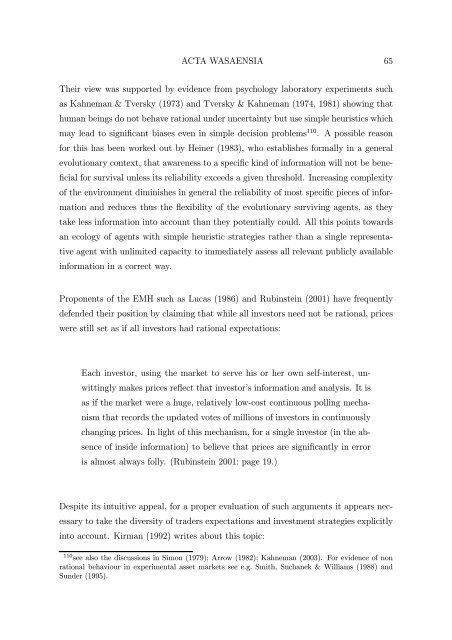BERND PAPE Asset Allocation, Multivariate Position Based Trading ...
BERND PAPE Asset Allocation, Multivariate Position Based Trading ...
BERND PAPE Asset Allocation, Multivariate Position Based Trading ...
You also want an ePaper? Increase the reach of your titles
YUMPU automatically turns print PDFs into web optimized ePapers that Google loves.
ACTA WASAENSIA 65Their view was supported by evidence from psychology laboratory experiments suchas Kahneman & Tversky (1973) and Tversky & Kahneman (1974, 1981) showing thathuman beings do not behave rational under uncertainty but use simple heuristics whichmay lead to significant biases even in simple decision problems 110 . A possible reasonfor this has been worked out by Heiner (1983), who establishes formally in a generalevolutionary context, that awareness to a specific kind of information will not be beneficialfor survival unless its reliability exceeds a given threshold. Increasing complexityof the environment diminishes in general the reliability of most specific pieces of informationand reduces thus the flexibility of the evolutionary surviving agents, as theytake less information into account than they potentially could. All this points towardsan ecology of agents with simple heuristic strategies rather than a single representativeagent with unlimited capacity to immediately assess all relevant publicly availableinformation in a correct way.Proponents of the EMH such as Lucas (1986) and Rubinstein (2001) have frequentlydefended their position by claiming that while all investors need not be rational, priceswere still set as if all investors had rational expectations:Each investor, using the market to serve his or her own self-interest, unwittinglymakes prices reflect that investor’s information and analysis. It isas if the market were a huge, relatively low-cost continuous polling mechanismthat records the updated votes of millions of investors in continuouslychanging prices. In light of this mechanism, for a single investor (in the absenceof inside information) to believe that prices are significantly in erroris almost always folly. (Rubinstein 2001: page 19.)Despite its intuitive appeal, for a proper evaluation of such arguments it appears necessaryto take the diversity of traders expectations and investment strategies explicitlyinto account. Kirman (1992) writes about this topic:110 see also the discussions in Simon (1979); Arrow (1982); Kahneman (2003). For evidence of nonrational behaviour in experimental asset markets see e.g. Smith, Suchanek & Williams (1988) andSunder (1995).
















